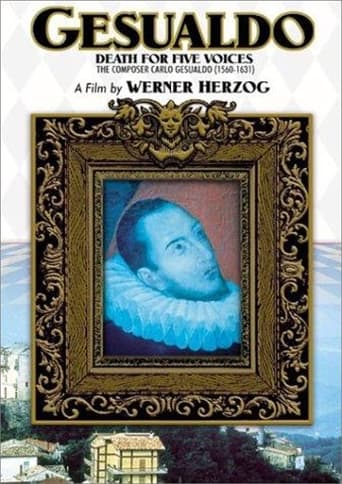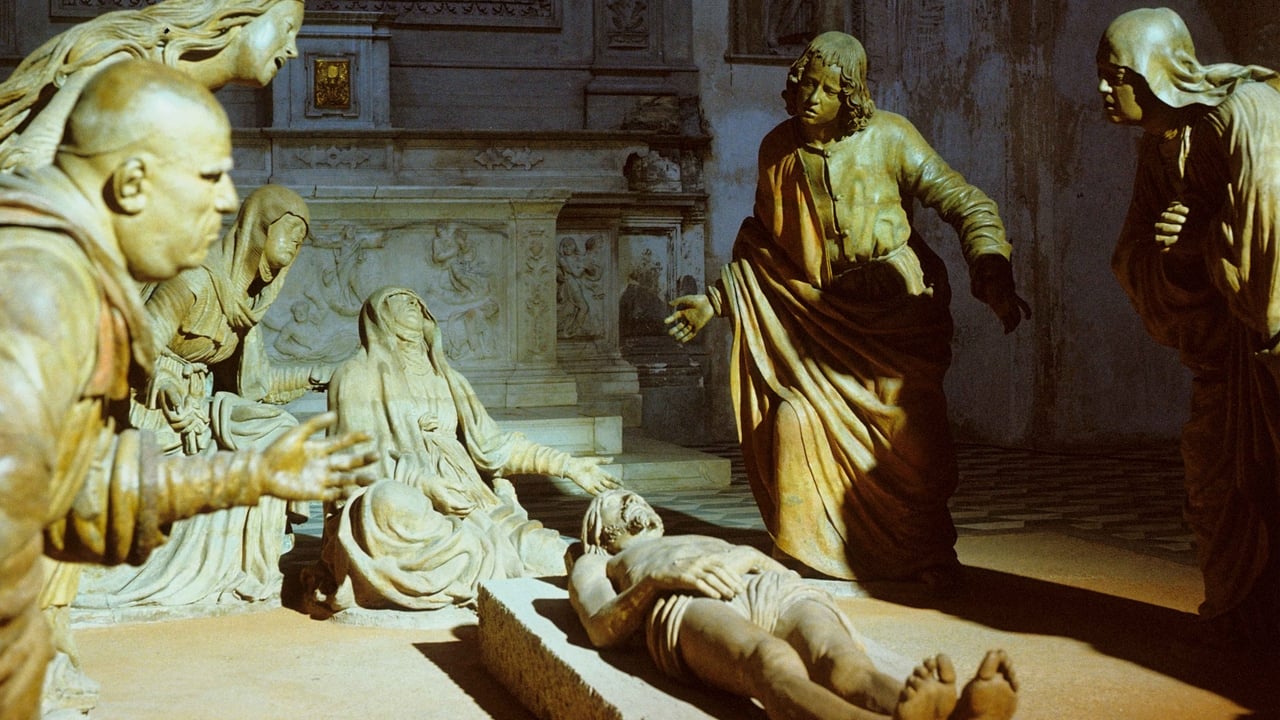chaos-rampant
We really do change a lot. Two years ago this was another Herzog-story on creative madness to me, one of many small ones he has done.I saw it this time with insights from a classically trained musician friend, and myself steeped in observation of storybased limits in Wagner as well as Italian Futurist writings from the 1910's about chromatic -abstract- harmony, among other things on disharmony I have been looking into.The piece is deceptively simple: disguised as documentary truth, we have, pieced together from several narrators, a short story on madness, tormented love, and musical genius that transcends the holy (from the time before Bach). And if the musings of the rough-hewn caretaker of the ruined estate can be safely waven off as tall folk legend, the by all means respectable director of the Gesualdo institute projects confidence, as he looks up from his stack of papers, that he is recounting an account of actual history of things as they happened.We go on to visit places central in events of that story, as well as closely examine some of the trinkets of drama: the actual bed where murders took place, the gruesomely displayed skeletons "most likely" those of illicit lovers.Other narrators are much more obviously unreliable than would satisfy truly fine limits between reality and fiction, but even so, many viewers have come out of this confused. It seems, from the perspective that this is really an account, a gross miscalculation on Herzog's part to include the obviously set-up bit with the supposed mad opera singer, interjecting staged eccentricity in the midst of truth. Not at all.The point is that down to the original - judicial - account, we only have testimonies and conjecture, and we can plainly see from testimonies Herzog has gathered in the course of the film, how difficult it is to surmise the real thing from stories about it. We come out of this with slight variations on the portrait of a man, with dissonance between the voices telling the story. The only truth left is in the music, excerpts of which are marvellously conducted for us.And how stupendous, that music - offered to god - is about slight dissonance between different voices, each one harmonical within itself, but the whole has subtle disharmony that is its own chromatic truth in the face of the harmony of logic, and that truth is we are dissonant beings.If you thought Herzog's recent Cave of Dreams was too ordinary, look again. It's about the same dissonance in our narrative devices.
Sinnerman
Oh my, this documentary has a lingering fascination with the colourful life of one helluva kinky dude! From masochism to homo eroticism, from murder to insanity, nothing ordinary inhabits the skin of this castle dwelling Prince/ "amateur musician". And yes, I friggin' loved it!! For all the wrong reasons, of course...Like the disparate five voices performing Gesualdo's Midralgo masterpieces, this extremely off-kilter documentary is brimming with schizo discordance worthy of a Herzog stamp. At times godawfully serious, at others offbeat deadpan. Eventually, the film veered off the edge and into LOL looney territory. This straight talking heads docu meet Spinal Tap-like hi-jinks is so generously sprinkled with Pythonite dust, it has become a monster hybrid which only Herzog is capable of making. Yes, once again, we were all fooled by the solemn music and the narrator's earnest German accented voice. And ladies and germs, that ending? Priceless. OK, my quips on this flick so far cannot do it justice. Herzog devotees out there, drop what you are doing right now! Go hunt it down already!Sample below classic lines from yet another Herzogian masterpiece:Italian Chap to a crazy woman: "What is your address? How can I contact you?" Crazy Woman, who is a self-professed incarnate of Gesualdo's murdered wife (don't ask): "I live up in heaven. You can take a helicopter up to find me...."
Jeremy Dimmick
At a pinch, I suppose I'd accept that some of the lurid carryings-on and local legends that have gathered around the figure of the composer Gesualdo, and are retailed here with a gleeful lack of critical scrutiny, might actually be true. Perhaps quite a lot of them are, but it doesn't really matter, because Herzog seems at least as interested in the way that people create, exploit and enjoy the legends, as in the composer himself or his music. Some sequences are very obviously staged for the camera, and Herzog seems almost to be daring us to believe that we really are talking to, say, a mad ex-opera singer who believes herself to be the reincarnation of Gesualdo's murdered first wife. The results are certainly very, very funny -- but everything pales before the irrepressible wife of a local chef, who disrupts his efforts to tell us about Gesualdo's extravagant menus with a torrent of abuse dedicated at the composer, whom she regards as the devil incarnate.But then, for all its contrivances, the whole film has a deadpan, dishevelled feel about it. No effort is made to disguise that the resident expert Gerald Place is talking from notes or keeps developing a nasty frog in his throat: as one of the few people in the documentary who seems basically sensible, he has to be quietly sent up some other way! Only the intelligent and rather sympathetic Principe d'Avalos seems to escape with his dignity intact -- perhaps because he's aristocracy.Musical duties are divided between two groups of singers. The Gesualdo Consort of London mostly sing in tune, the Complesso Barocco mostly don't -- the avant-garde quality is certainly exaggerated by the problems with intonation in what is very difficult music. As with the interviews with Gerald Place I get the impression Herzog didn't want to do retakes if things went slightly wrong, and the singing certainly has plenty of enthusiasm. Only he can be blamed for the way the audio and visual get out of sync by a couple of seconds in close-ups of the director in one of the musical performances; but somehow it all seems to add to the effect of cheerful bizarrerie. How a specialist in Renaissance music would react to this documentary I dread to think (I'm sure there'd be some swearing and gesticulation) but as social comedy it's priceless.
nbott
Gesualdo was a nutcase, but a brilliant one. His madrigals are among the most moving moments in music history. You will walk away from this film realizing all of the above. While using what appears to be actual employees at the various sites of Gesualdo's life, we are given a tour of his physical life and his music. There are performance excerpts from his madrigals. There is a learned professorial type giving us a biography of his life.Simply put, if you enjoy great vocal music, you will want to go out and buy recordings of this master artist. I have recordings of his first 5 books but I can not yet find a recording of his 6th book of madrigals. This film is not quite the over-the-top approach that Mr. Herzog usually takes, but it is quite strange anyway. It is now out on DVD and I highly recommend it.


 AD
AD

